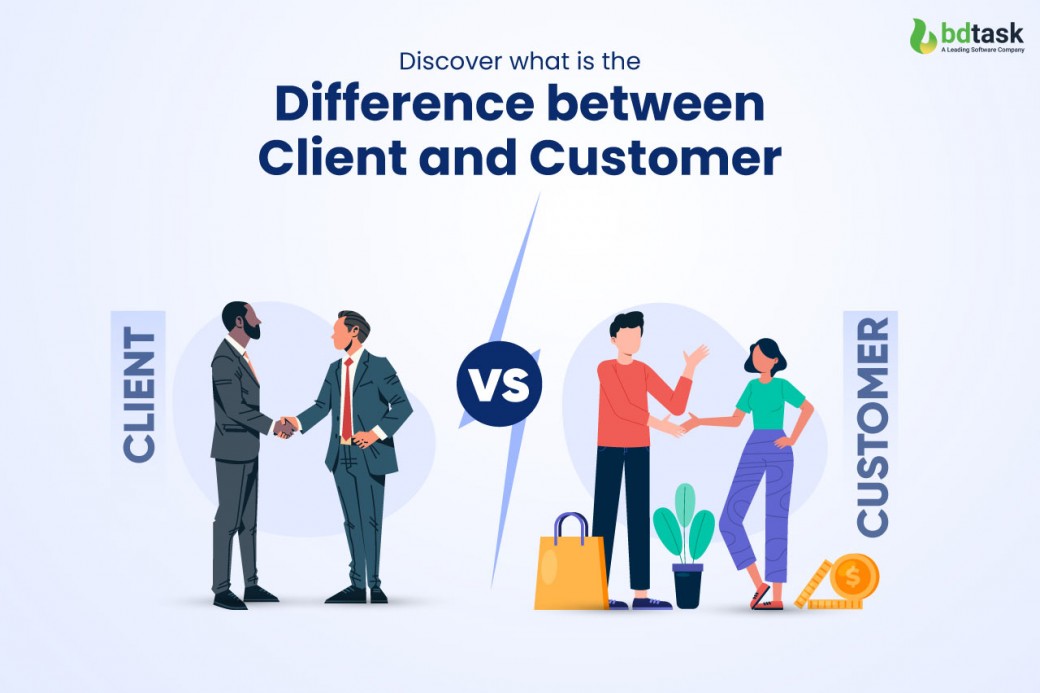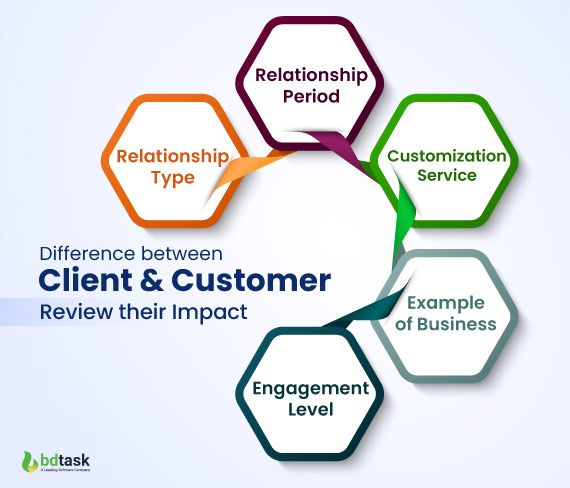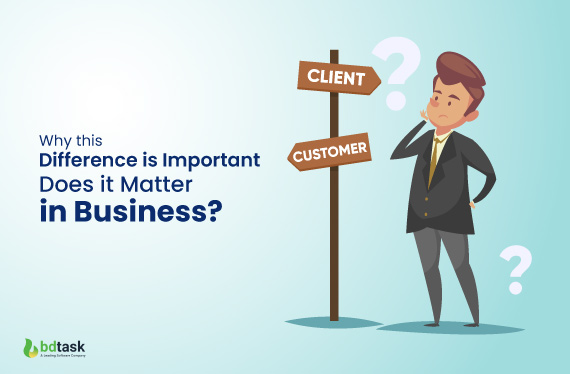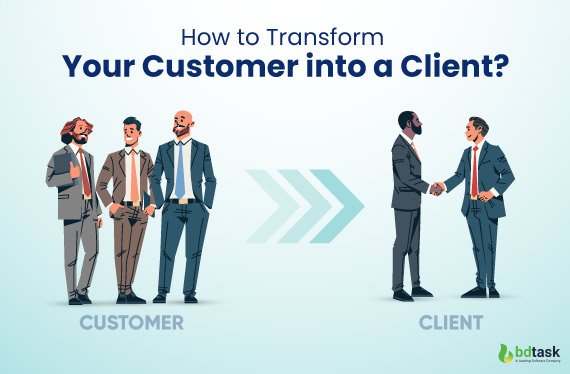Discover What is the Difference between Client and Customer

If you are a seller of products or services, you should know what is the difference between client and customer. You might think these are the same category but you will be surprised to know they are quite different.
Client vs customer differences is an important distinction that every business person should know how it impact the business. Learning the difference between these will help you to make marketing strategies to meet your needs. Furthermore, Its primary purpose is to help you engage customers more and understand the market target.
In this article, I will describe what is the difference between client and customer & its definitions and characteristics. Besides, let's explore some tips on converting customers into clients.
What is a Customer?
A customer is a person or business that buys goods or services from another third party. In business, customers buy goods, products, or services from a seller or vendor exchanging money. Customer is also called consumer, buyer, and purchaser.
Businesses make unique products and advertise them to get more customers like Tesla, Apple, and Google.
What is a Client?
The definition of a client is a person or professional who takes service from your business. Clients receive a service or advice in return for payment.
For instance, if you are a legal advisor, your clients can be individuals or businesses who hire you by payment.
Another example is if you are a real estate agent, the sellers and buyers hire you to help them buy and sell. Buyers and sellers are the main clients of your business.
What is the Difference between Client and Customer: Review their Impact on Business

Generally, clients are commonly more used in professional industries. Customer is widely used in retail and goods industries. Let’s explore how a client differs from a customer and the example of industries based on customer vs client services.
#1. Relationship Type: Relational vs Transactional
The relationship between business and clients is all about making relationships. Clients want long-term goals; you need to understand their needs and tailor them as they wish. It's not a one-time transition but making long-term sustained engagement.
On the other hand, the relationship between customers and business is all about transactional. Customers are only looking for a product or service to purchase. They don't have the intention to make a relationship with your company.
#2. Relationship Period: Long-Term vs Short-term
Clients are constantly committed to engaging with your business. They stick around your company to build partnerships for the long-term goal and long-term value.
They prefer and value your professional services like advanced business operations, updated legal and financial issues or growth strategies. So they keep coming back regularly.
In contrast, customers purchase standard products or services everywhere. They are concerned only initial value of their immediate purchase of products or services & their price, quality, and convenience.
#3. Customization Service: Personalized vs Standard
Clients expect a high level of attention and customized service & products. Businesses provide tailored products & services to clients according to their needs and preferences. As a business owner, you should treat clients with high attention and unique services.
Customers often receive standardized products or services. They are constantly ready to shop at roadside markets or eat meals in a supermarket. Their expectation level at customization is usually low.
#4. Engagement Level: High vs Low
Remember, clients are more loyal customers to your business. Clients deeply engage with your business and expect personalized services, expressive communication, and regular meetings in the client workplace.
On the contrary, customers, like riders on a subway, come on and off as needed. They don't require high engagement and more profound expectations. Their primary and obvious intention is the limited transaction.
#5. Example of Business: Based on Client vs Customer
What is the difference between client and customer in business depends on the business’s perspective and type. Intelligent entrepreneurs know how to spend time and provide service to their customers.
// Client-Based Business:
- Marketing Agency
- Insurance Agency
- Design Agency
- Security Agency
- Real Estate Agency
- Law Firm
- Accounting Firm
- Healthcare Center
- Banking Sector
- Network Operator Company
// Customer-Based Business:
- Restaurant/ Cafe
- Retail Store
- Subscription-based Company
- Amusement Park
- Bank
- Saas Product
- Shopping Market
Why this Difference is Important: Does it Matter in Business?

To learn and understand The difference between clients and customers is essential for any business. This understanding can guide your service strategies, sales planning, and marketing efforts. Let's talk about why this difference is crucial:
- Knowledge of Customer Needs
Businesses get a proper identity and can respond to each group through advertising, sales, and tailoring marketing based on needs & performances.
- Altering Services and Support
Clients generally require more attention and support than customers. Businesses can provide altering services and support to the clients to make strong bonds. This relationship bonding increases revenue and satisfaction in the future.
- Make Long-term Relationships
Clients generate short-term relationships, while clients create long-term relationships with businesses. Businesses can support customers immensely to make them loyal clients with long-term relationships.
- Impact on Pricing Strategies
Businesses offer affordable prices for their products or services to attract ordinary customers in a wide range. In contrast, enterprises charge higher pricing rates as they provide customized and personalized service to clients.
- Planning Marketing Campaign
Businesses can make their products and services target their audience. They can also implement their marketing campaigns based on the characteristics and preferences of customers and clients.
Customers vs Clients: Which is Needed in Business?
Client and customer relationships are vital and impact business in many ways. If you are part of the B2B industry, your B2B company needs productive experience and long-term relationships with your prospects. What will be the most idle that enlighten your business to grow simultaneously? Let's discuss:
- All businesses have customers but not clients. Clients, by definition, get more personalized attention and more access to business, while a customer has a transactional relationship with the company.
- Customers can walk away if they need an immediate solution and may be dropped off after one billing cycle. In contrast, clients are usually long-term customers who are loyal and transform them into clients.
- Clients ask questions to clarify and give feedback to improve the product solution. Each other's outcomes impact companies and clients, and they move forward together. However, this is not possible for customers if the business strategy stays in the empire of customers.
How to Transform Your Customer into a Client?

Customers automatically convert into clients When they get premium service and authentic products from you. After a discussion of what is the difference between client and customer, you may ask a question. How do you convert your customers into clients? Now, let's discuss:
- Identify Customer Needs
You should aim to focus on your customer's needs and improve their lifestyle by addressing their needs. Customers prefer those who have more than just selling intentions. So, Act as a guide in your business operations with great expertise and support.
- Provide Outstanding Customer Service:
Businesses that provide excellent service may need proper customer service to recurring business with their customers. Because customers are more likely to purchase more and recommend when they get the best customer service.
For example, you can add a live chat Innue into your business to provide excellent customer service and develop good relationships.
- Maintain Regular Communication
Customers intend to purchase that business where they get values on their opinion. So, you should communicate with customers regularly to develop them into clients. Understanding their requirements and offering personalized service lets them know you admire and value them.
- Focus on Product or Service Quality
Ensure your customers that your product is consistent in quality and premium service. Always be truthful, genuine, and friendly to gain their trust. Ask your customers for the sale when you understand that customers are ready to go to the sales funnel.
- Follow Up your Customers
after purchasing, follow up regularly on every customer's feedback and review. A follow-up strategy in your business can help you to get more success.
Studies show that that 80% of sales need five or more follow-ups to occur. With a chatbot Innue, you can follow up with your customers about your products or services.
- Make Chat Conversational
Make the conversation with customers conversational. Discuss business and product issues briefly so customers can understand your view and accept you as a trustworthy expert.
Remember, your meeting should be conversational, not to pressure doing sales. Make your customers feel individually respected and remembered instead of less valued.
Conclusion
Understanding what is the difference between client and customer is essential for your business to grow marketing, sales, and services.
Knowing this difference, you can increase customer acquisition by offering qualified & authentic products or services. Besides, competitive pricing, effective marketing strategies, and enhanced customer service leverage positive customer reviews and recommendations.










